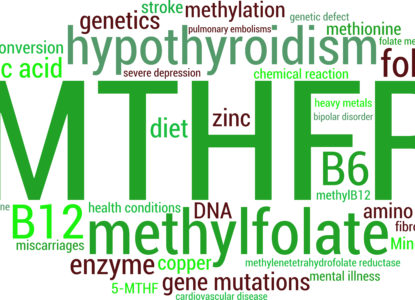MTHFR and Folic Acid “Build Up”: What You Need to Know
Article at a Glance
- Studies show that folic acid can build up in the bloodstream when taken at high doses.
- Common MTHFR SNPs, which reduce function in some individuals, make it harder to convert folate and folic acid into a form the body can use.
- Studies suggest that defective folate metabolism may cause folic acid to accumulate in high concentrations, even without folate supplementation.
- The issue is most pressing for those of us who carry homozygous “mutations” in rs1801133 (MTHFR C677T).
Genes Mentioned

Contents
Getting proper folate in the diet is important for our overall health, with doctors recommending folate supplementation to avoid neural tube defects, poor pregnancy outcomes, anemia, and even cancer.
Concerns about folate deficiency, especially before and during pregnancy are well known. Less discussed is the type of folate consumers take when they supplement, and how folic acid affects health in those with a reduced ability to metabolize folate in its synthetic form.
Folic acid is synthetic B9
Folic acid refers to the synthetic form of vitamin B9 that is found in some dietary supplements and fortified foods. Folic acid is not in usable form, it has to be converted by the body.
- The body converts folate into methyltetrahydrofolate (MTHF). When this conversion mechanism is lacking certain enzymes, is overwhelmed, or is too slow, folic acid can build up in the serum as un-metabolized folic acid (UMFA).
- High dose folic acid supplements can prevent neural tube defects in babies, but can also mask the symptoms of pernicious anemia which is a vitamin B12 deficiency that dampens the bone marrow’s ability to make blood cells.
- While higher doses of folic acid seem to benefit pregnant mothers, most supplements marketed to the general population contain mega-doses that exceed the recommended daily intake.
- Those taking folic acid supplements in the Framingham cohort were 2.3-fold more likely to have high circulating UMFA than those who didn’t supplement.
An estimated 60% of US adults “have MTHFR”
MTHFR (methylenetetrahydrofolate reductase) is the enzyme produced by the MTHFR gene. It’s required for metabolizing folate and breaking down the amino acid homocysteine.
- Up to 60 % of the U.S. population have an MTHFR genetic enzyme variant that, for the most part, goes unnoticed. In individuals with two copies of common MTHFR variants, like A1298C and C677T, the ability to convert folic acid into active MTHF is reduced.
- These variants are surprisingly common. It has been estimated that in America, about 25% of Hispanics and 10-15% of Caucasians have two copies of C677T variant.
Recent observations suggest that patients with the C677T MTHFR genotype may have higher folate requirements than individuals with a normal genotype.
Un-metabolized folic acid
Those with two copies of the MTHFR polymorphism (homozygous) cannot efficiently convert folic acid into a usable form. Studies suggest that this defective metabolism may cause folic acid to accumulate in high concentrations. This is referred to as UMFA.
- One study found that un-metabolized folic acid was detected in 78% of fasting plasma samples from healthy participants who were not taking folic acid supplements.
- The authors indicate that this was due to increased consumption of fortified foods, as opposed to more natural forms of food containing folate.
- Instead of folic acid as a supplement, the active form known as 5-MTHF is a better option for some since it bypasses the defective MTHFR enzyme, providing the body with the final active product.
- Individuals affected by the MTHFR homozygous mutation may want to consider modifying their diet and decreasing their intake of fortified wheat flour and folic acid supplements.
Do individuals with variants in MTHFR respond differently to folic acid?
More than 20% of people with MTHFR variations are thought to be affected, although there is no such thing as MTHFR symptoms. Additionally, different variants may have slightly different responses to folic acid supplementation.
- The C677T variation results in a 35% reduction in activity for heterozygotes individuals (those with single mutations) and a 70% reduction in activity for homozygous individuals (those with double mutations).
- Studies have shown that individuals with the MTHFR 677TT genotype (homozygous) have an average amount of folate in their blood that is roughly 16% lower than people without “mutations,” even when taking folic acid supplements.
- In a study looking at 932 subjects given various doses of folic acid, it was revealed that despite the dose of folic acid administered, the authors observed that blood folic acid concentrations were highest in 677CC homozygous, lower in the 677CT heterozygous, and lowest in the 677TT homozygous.
- These results confirmed that individuals with the MTHFR 677TT genotype have increased requirements compared to those with the CC and CT genotypes, and should supplement with 5-MTHF.
Natural sources of Folate
As mentioned previously, 5-MHTF is the predominant micronutrient form of folate (not folic acid) that circulates in plasma and is required for important biological processes.
Unlike folic acid, 5-MTHF can cross the blood-brain barrier and does not mask pernicious anemia or vitamin B12 deficiency in the way that folic acid does. It is also readily available to transport in the blood stream and can be safely taken in high doses. 5-MTHF supplementation has been shown to effectively improve folate biomarkers in young women during early pregnancy and can prevent neural tube defects.
If you wish to naturally increase your folate intake, the best foods with high folate content can be found in the following:
- Beef Liver: 215 micrograms
- Spinach: 131 micrograms
- Black-Eyed Peas: 105 micrograms
- Fortified Rice: 90 micrograms
- Asparagus: 89 micrograms
- Enriched Spaghetti: 83 micrograms
- Brussels Sprouts: 78 micrograms
- Romaine Lettuce: 64 micrograms
- Avocado: 59 micrograms
- Broccoli: 52 micrograms
MTHF supplements
The most biologically active folate supplements are those that include:
- (6S)-5-methyltetrahydrofolic acid, monosodium salt or L-methylfolate
- (6S)-5-methyl-tetrahydrofolic acid, calcium salt or L-methylfolate
- (6S)-5-methyltetrahydrofolate or (6S)-5-MTHF
Be sure to also read my recent post on methylfolate side effects.



